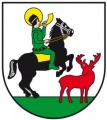Category:Saint Eustachius: Difference between revisions
Knorrepoes (talk | contribs) (Created page with '{|width="100%" style="color:black; background-color:#ffffcc;" |width="15%"|<randomimage size="100" float="center" /> |width="70%" align="center" |<font size=x-large>'''Heraldry o…') |
Knorrepoes (talk | contribs) No edit summary |
||
| Line 11: | Line 11: | ||
A series of calamities followed to test his faith: his wealth was stolen; his servants died of a plague; when the family took a sea-voyage, the ship's captain kidnapped Eustace's wife Theopista; and as Eustace crossed a river with his two sons Agapius and Theopistus, the children were taken away by a wolf and a lion. Like Job, Eustace lamented but did not lose his faith. | A series of calamities followed to test his faith: his wealth was stolen; his servants died of a plague; when the family took a sea-voyage, the ship's captain kidnapped Eustace's wife Theopista; and as Eustace crossed a river with his two sons Agapius and Theopistus, the children were taken away by a wolf and a lion. Like Job, Eustace lamented but did not lose his faith. | ||
He was then quickly restored to his former prestige and reunited with his family; but when he demonstrated his new faith by refusing to make a pagan sacrifice, the emperor, Hadrian, condemned Eustace, his wife, and his sons to be roasted to death inside a bronze statue of a bull or an ox, in the year AD 118. | He was then quickly restored to his former prestige and reunited with his family; but when he demonstrated his new faith by refusing to make a pagan sacrifice, the emperor, Hadrian, condemned Eustace, his wife, and his sons to be roasted to death inside a bronze statue of a bull or an ox, in the year AD 118. (Source Wikipedia) | ||
[[Category:List of themes]] | [[Category:List of themes]] | ||
Revision as of 14:22, 19 November 2014
| <randomimage size="100" float="center" /> | Heraldry of the World Thumbnails > Themes > Religious images |
<randomimage size="100" float="center" /> |
Coats of arms showing St. Eustachius (Eustace).
According to legend, prior to his conversion to Christianity, Eustace was a Roman general named Placidus, who served the emperor Trajan. While hunting a stag in Tivoli near Rome, Placidus saw a vision of a crucifix lodged between the stag's antlers. He was immediately converted, had himself and his family baptized, and changed his name to Eustace (Greek: Ευστάθιος (Eustáthios), "well stable", or Ευστάχιος (Eustáchios), "fruitful/rich grain").
A series of calamities followed to test his faith: his wealth was stolen; his servants died of a plague; when the family took a sea-voyage, the ship's captain kidnapped Eustace's wife Theopista; and as Eustace crossed a river with his two sons Agapius and Theopistus, the children were taken away by a wolf and a lion. Like Job, Eustace lamented but did not lose his faith.
He was then quickly restored to his former prestige and reunited with his family; but when he demonstrated his new faith by refusing to make a pagan sacrifice, the emperor, Hadrian, condemned Eustace, his wife, and his sons to be roasted to death inside a bronze statue of a bull or an ox, in the year AD 118. (Source Wikipedia)
Media in category "Saint Eustachius"
This category contains only the following file.
- Atzendorf.jpg 350 × 391; 20 KB
